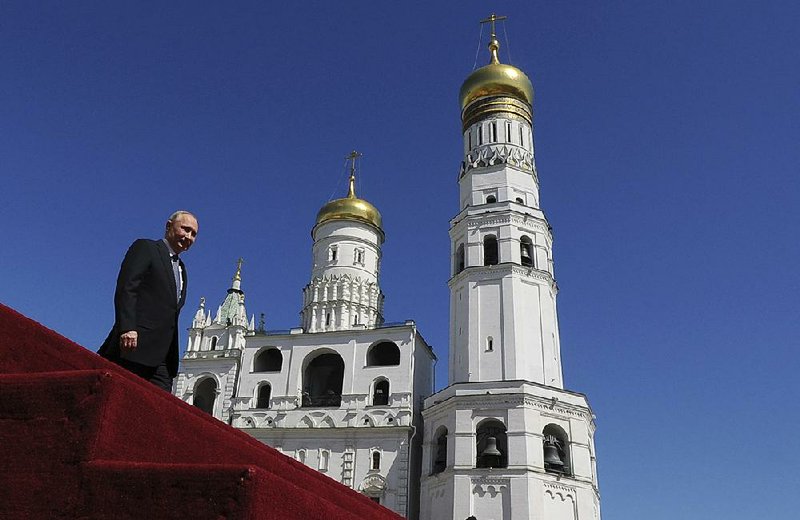MOSCOW -- Vladimir Putin took the oath of office Monday for a fourth term as Russia's president, in a ceremony staged in a gilded Kremlin hall once used to crown czars and replete with pageantry.
Putin, a former KGB agent, has ruled Russia as prime minister or president for more than 18 years, and in that time has crafted an image as a steely nerved leader and the man best qualified to rebuild his country after the collapse of the Soviet Union.
A televised ceremony began Monday with Putin sitting at his desk in the Kremlin, suit jacket looped over his chair, as if hard at work until moments before the ceremony. A phone rang, letting him know it was time for his fourth term; he donned his jacket and walked alone through the red-carpeted Kremlin corridors and into a hall packed with about 6,000 invited, cheering guests.
In a short speech, Putin suggested his focus had now turned to domestic matters and improving Russia's economy for the "well-being of every family," though there were no words of reconciliation in the country's tense relations with the West.
"The country's security and defense capabilities are reliably ensured," Putin told the audience of government ministers, lawmakers, religious leaders and celebrities.
"Now we will use all the possibilities we have first of all for the resolution of internal, and most essential, tasks of development," he said. "A new quality of life, well-being, security and health for the people, that is what is important today."
Improving the economy after a recession partly linked to international sanctions will be a primary goal of his next six-year term, Putin said.
"Russia should be modern and dynamic, it should be ready to accept the call of the times," he said in his inauguration speech
Putin won re-election in March with nearly 77 percent of the vote, the largest margin for any post-Soviet leader. It was a result that his backers said showed widespread support, but one his critics dismissed as illustrating the stifling of any real opposition.
While lower key than Putin's inauguration in 2012, the ceremony's regal themes nevertheless gave it the air of a coronation.
The honor guard and flag bearers wore uniforms with tall military caps, of a style dating from Russia's war with Napoleon in 1812. The ceremony unfolded in a Kremlin hall used to crown three czars -- Alexander II, Alexander III and Nicholas II -- as well as previous presidential inaugurations. And later, Patriarch Kirill, head of the Russian Orthodox Church, gave Putin an 18th-century icon while blessing him for his new term.
Abroad, Putin has sought to restore Russia's sway in world affairs. During his third term as president, he intervened militarily in Ukraine and Syria, putting him at loggerheads with the West. And, according to U.S. intelligence agencies, he directed Russia to meddle in the 2016 presidential election to aid Donald Trump.
At home, he has presided over the restitution to power of the security agency he once served. But the domestic economy has continued to lag, only recently emerging from a painful recession. He has also clamped down on critics, arresting scores of opposition activists and restricting the media.
European election observers with the Organization for Security and Cooperation in Europe wrote that his recent re-election "took place in an overly controlled legal and political environment marked by continued pressure on critical voices."
Underscoring that point, two days before the inauguration, police arrested about 1,600 people at protest actions called "He is not our czar."
The arrests added images of swinging nightsticks and shoving matches with the police to the inaugural events. The repression, Vedomosti, a business newspaper, wrote, risked "spoiling the upcoming inauguration more even than the protest."
Putin signed decrees Monday outlining his goals, such as reducing poverty and, by the end of his term, raising Russian life expectancy to 78 years, from 72 now.
He also issued an extensive decree calling for "acceleration of the technological development of the Russian Federation" and "creation of a high-performance export-oriented sector in the basic sectors of the economy, primarily in manufacturing and the agro-industrial sector."
He signaled political continuity by nominating a longtime ally, Dmitry Medvedev, as prime minister. The pro-Putin United Russia party that dominates the parliament said it would back Medvedev in a vote today, Russian news agencies reported.
Whether Putin shifts gears on economic policy hinges on the possible appointment of a liberal economist, Alexei Kudrin, a former finance minister, to a new post as economic adviser, analysts said. Kremlin hard-liners oppose Kudrin for advocating an easing of tensions with the West, as well as efforts to revive trade. Kudrin has also argued for raising taxes and the retirement age to shore up the budget.
Russia's economy was hit hard by low world oil prices and sanctions connected to Moscow's 2014 annexation of Crimea and military involvement in the separatist uprising in eastern Ukraine, with the ruble losing half its value between 2014 and 2016.
The country recorded an anemic improvement in 2017, with gross domestic product rising 1.5 percent and the ruble recovering some of its value. But the currency dropped about 8 percent again last month after new U.S. sanctions.
Information for this article was contributed by Andrew E. Kramer of The New York Times; and by Jim Heintz of The Associated Press.
A Section on 05/08/2018

